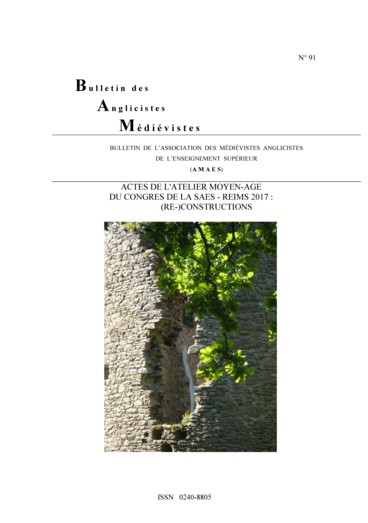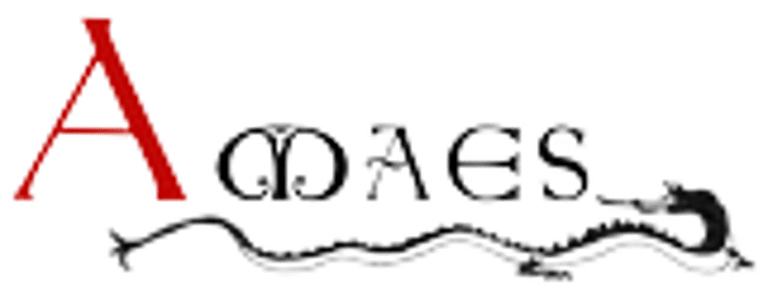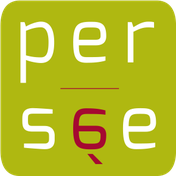Our scientific journal: EMA
Presentation
The journal Études Médiévales Anglaises (ÉMA, ISSN: 0240-8805) is a peer-reviewed pluridisciplinary journal founded in 1972. Its aim is to publish articles concerned with medieval England, its culture and its language, as well as reviews of academic books pertaining to those topics. Articles may be written in French or English. All articles are examined by two anonymous reviewers before they can be accepted for publication. published by the Association des Médiévistes Anglicistes de l'Enseignement Supérieur (AMAES).
All back issues of the journal are freely accessible on the Persée portal, and our journal is indexed in the Modern Language Association's international bibliography.
Table of contents
Below are the contents of the latest issues of EMA
EMA n°104 (2025) - Sir Gawain and the Green Night, Texte et Images
EMA n°103 (2024) - Transmission(s) dans la littérature, l’histoire, et les langues de l’Angleterre médiéval
EMA n°102 (2023) - Langues de l'Angleterre médiévale
EMA n°101 (2023) - Perspectives néo-médiévales : du palimpseste à la trace
EMA n°100 (2022) - Numéro Anniversaire
EMA n°98 (2021) - Le vêtement, un signe complexe dans la littérature, la culture et la société de l'Angleterre médiévale
EMA n°97 (2020) - Renaissance
EMA n°96 (2020) - Pestilence et résilience
EMA n°95 (2019) - L'Angleterre médiévale, les "races" et le racisme
EMA n°94 (2019) - L'espace au Moyen Âge
EMA n°93 (2018) - Exception
EMA n°92 (2018) - Révolutions
BAM n°91 (2017) - (Re-)Constructions
BAM n°90 (2017)
BAM n°89 (2016)
BAM n°88 (2016)
BAM n°87 (summer 2015)
BAM n°86 (winter 2015)
BAM n°85 (summer 2014)
BAM n°84 (winter 2014)
BAM n°83 (summer 2013)
BAM n°82 (winter 2013)
BAM n°81 (summer 2012)
BAM n°80 (winter 2012)
BAM n°79 (summer 2011)
BAM n°78 (winter 2011)
BAM n°77 (summer 2011)
BAM n°76 (winter 2010)
BAM n°75 (summer 2010)
BAM n°74 (winter 2009)
BAM n°73 (summer 2009)
BAM n°72 (winter 2008)
BAM n°71 (summer 2008)
BAM n°70 (winter 2007)
BAM n°69 (summer 2007)
BAM n°68 (winter 2006)
BAM n°67 (summer 2006)
How to obtain an issue of EMA
EMA is published twice a year ( one issue in winter, one in summer).
AMAES members receive copies free of charge at home (Join AMAES).
Non-members can also order a copy from the association's secretary, Olivier Simonin (purchase price: €15).


Director of the journal
The journal is directed by the President of AMAES, currently Colette Stévanovitch.
Editorial manager
The editorial manager of the journal is the AMAES secretary in charge of publications, currently Agnès Blandeau.
Editorial Committee
The editorial manager is supported by a committee that works with her to define the themes of future issues and ensures that they are published on time. The committee currently comprises Claire Vial, Fanny Moghaddassi, Tatjana Silec and Elise Louviot.
Editorial policy
Organization
Scientific board
The journal's Scientific Committee guarantees the scientific quality of the articles published. It is currently made up of the following members: :
Agnès Blandeau, Université de Nantes
Florence Bourgne, Université Paris-Sorbonne
Leo Carruthers, Université Paris-Sorbonne
Jean-Marc Chadelat, Université Paris-Sorbonne
Catherine Delesse, Université de Lorraine
Sandra Gorgievski, Université de Toulon
Petya Ivanova, Université de Genève (Suisse)
Judith Kaup, University of Surrey (Royaume Uni)
Brian Lowrey, Université de Picardie
Stephen Morrison, Université de Poitiers
Raluca Radulescu, Université de Bangor (Royaume Uni)
Amanda Roig Marin, Université d’Alicante (Espagne)
Catherine Royer-Hemet, Université du Havre
Olivier Simonin, Université de Perpignan
René Tixier, Université de Toulouse II - Jean Jaurès
Fabienne Toupin, Université de Tours
Field of study
The journal is devoted to medieval England in all its facets. It is interdisciplinary and open to the most varied methodological approaches. Publications in the fields of literature, philology, linguistics, history and the history of art naturally find their place here. The study of texts in Old English and Middle English is obviously at the heart of the journal's concerns, but its scope of investigation extends far beyond this: Anglo-Latin and Anglo-Norman texts, representations of medieval England in other corpora, modern and contemporary medievalisms, and the political or cultural links of medieval England with the rest of the British Isles or with the continent.
Content and periodicity
The languages of the journal are French and English. The journal is published twice a year. Since 2018, EMA has focused on the publication of thematic issues. In addition to research papers, many issues also contain book reviews.




2
1
Mutual commitment
The author of the article undertakes to provide original content, free from any plagiarism (including texts previously published by the said author). All sources used must be correctly identified and any significant contribution made by a third party must be explicitly acknowledged (possibly by naming the person concerned as co-author of the article). If an image is included in the article, the author must ensure that he/she holds the publication rights for the image in question for this article.
The author authorises the journal to publish his or her article in paper form in the planned issue and in digital form as part of the partnership between the journal and the Persée portal (2-year sliding scale).
3
The author undertakes not to republish his or her article (in whole or in part) in another publication without the prior permission of the journal Études Médiévales Anglaises.
The experts solicited undertake to formulate their opinions in a courteous and constructive manner.
The editorial board of the journal undertakes to subject all articles received within the specified time to an anonymous and impartial evaluation process and to transmit to the author the result of this evaluation, whether positive or negative.
The editorial committee undertakes to ensure that accepted articles are published in paper format in the planned issue and that they are sent to Persée for digital publication once the 2-year sliding scale has expired.
The journal Études Médiévales Anglaises authorises the author to make the published version of his/her article available free of charge on an online digital archive (e.g. HAL) within one year of the article's publication in paper form. The version made available must clearly indicate the references of the issue of the journal in which the article appeared.
4
5
6
7
Submission and evaluation process
Each issue is the subject of a call for papers published on the association's website and by a number of partners.
Each article undergoes a double-blind review within 3 months. Final acceptance of the article will depend on the corrections and amendments requested by the editorial committee.
No submission or publication fees will be charged to authors. Proposals for book reviews may be submitted directly to the journal's editorial manager.
Social
Contact
📧 association.amaes@gmail.com
📌 5 Rue Victor Cousin 75005 Paris

Legal



